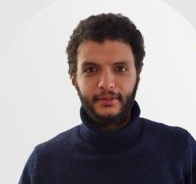Egyptian activist Sarah Hegazi was arrested, tortured and exiled - for raising a rainbow flag. Yesterday she was found dead. In her final letter, Sarah bestows forgiveness upon a cruel world. Those left behind, can’t be as forgiving.
State violence kills and exile devastates.
Egyptian queer and socialist activist, Sarah Hegazi, committed suicide in her forcible exile in Canada. Sara left Egypt after she was convicted of “debauchery”, breaching public order for raising a rainbow flag during the Mashrou’-Leila concert in Cairo in 2017. Memories of torture and imprisonment, of a broken dignity, trampled upon by a repugnant media, have not ceased to haunt her oversees, to let her fall victim of an on-going severe depression.
Canada is multicultural and gay-friendly, yet - like any forced exile - it is not safe enough to dispel depression and do away with loss and bitterness. Sarah lost her mother shortly after leaving Egypt and she could not go back to take farewell of her. In the absence of faces and places that could bear remnants of the perished mother, she probably had to mourn her deprived of any tactile intimacy that could have lingered agony and loss. Sarah’s sense of loss was actually multi-fold, for she was disgraced by hate-blinded masses; an oppressed society that internalized oppression and have unlearned empathy in return.
For regimes supporters and patriarchal moralists alike, her life seems an insufficient price to pay. Since her death has been made public, their dreadful comments have swept over social media, disavowing her, denying her even heavenly blessings.
How often do they want to kill her?
At the same time, calls of support and solidarity are no less present. Sarah’s death brought the often-forgotten misery of Egyptian queers back to light, enabling to read it in analogy to the pervasive forms of current state violence. This reading was itself a recurring notion in Sarah’s writings and activism.
The same regime that grounded its legitimacy on rescuing Egypt's secular identity from Islamist fanatics, the same regime that professes itself as Europe’s inevitable bulwark against floods of refugees and Islamist terror, has terrorized and persecuted Queers and trans people on a regular basis to purport moral rectitude. Yes, patriarchy is also secular.
“There is no difference between a jihadi terrorist with a shaggy long beard who wants to kill you, in the hope for an elevated place with his God in heaven; a hope for which he believes that he is eligible to kill anybody who does not look like him, and a beardless elegant dude with a modern phone and a luxury car, who tortures, abuses and jails because his boss will elevate him to a higher position for torturing and arresting anybody who does not fit into the herd” writes Sarah for Mada Masr in 2018.
After the alluded incident of the rainbow flag, Egypt has probably experienced its worst security crackdown against Queers and trans people ever. The mass random arrests and the homophobic media campaigns, that never have been as systematic and explicitly hateful as this time, have left behind a dense atmosphere of fear; fear that suffocates until today.
Sarah was killed by fear.
Queer fear is sometimes contagious and relentless. It can be temporarily soothed, it can be made dormant; the physical conditions that allow it to unfold can be abolished or suspended, but it continues to nag you in distant places. It continues to live under your skin. You smell it in the cold air of your exile, it lies on the surface of the things and bodies you touch. It can pop up in the corners of a city, when you suddenly realise that it will remain alien, no matter how often you walked the streets and cherished the company of its people. It inhabits our contemplations on longings and loss, it manifests itself in the sheer absence of home, the same home that we – oddly enough - escape it out of fear.
Sarah was killed by pain.
Queer pain is like queer love. It beggars description, it complicates narratives, transcends boundaries and withstand co-option. Queer pain kills its subjects, but it also troubles and destabilizes its witnesses; it triggers haters instead of assuaging their hatred; it provokes those who suffer it to speak it out and loud; it elicits compassionate action and rage for justice. Queer pain invites us to question familiar schemes of identifying violence, of charting its sources and lineages, of assessing its implicit forms and the various subtle ways of its perpetuation.
Sarah’s death is not in vain, as her life was not.
In her suicide note, she laments a world that was cruel to her, and was generous enough to bestow forgiveness upon it. In lamenting her death now, I can’t be as forgiving. Haunted by fear and racked by pain, my grief is raging. It can’t be consoled as long as such cruelty is rendered mundane.
________________________
Are you in distress and thinking about taking your own life?
In Germany, Telefonseelsorge can be reached on 0800 1110 111. In Egypt, you can dial: +20 7622381 - 7621602 - 7621603 and schedule an appointment here. In the UK, the Samaritans can be contacted on 116 123. In the US, the National Suicide Prevention Lifeline is 1-800-273-8255. In Australia, the crisis support service Lifeline is on 13 11 14. Other international suicide helplines can be found at www.befrienders.org.

















